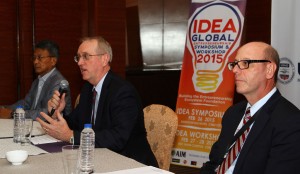Private, gov’t groups eye academe as important link

Brian Goldbeck, US deputy of mission, (center) answers questions from reporters during a press briefing about the Idea Global Symposium Forum at the Radisson Blu Hotel. With him are Diosdado Banatao (left), Philippine S&T Development Foundation Manila, Inc.; and Reed Aeschliman, deputy mission director of the United States Agency for International Development.
CDN PHOTO/TONI MARIE DESPOJO
With technology-driven entrepreneurship seen as a means for inclusive growth, this concept of entrepreneurship should be included in a learning institution’s academic curriculum.
There is a need to nurture an enabling ecosystem for the development of technology-driven entrepreneurship, said Ceferino S. Rodolfo, Department of Trade and Industry assistant secretary for Industry Development group, during his keynote speech at the IDEA Global Entrepreneurship Symposium and Workshop 2015 for Industry Development Group at a Radisson Blu Hotel Cebu yesterday.
Rodolfo said the administration’s thrust to ensure inclusive growth means providing opportunities for every Filipino to be part of the the national economic development and growth.
“The key challenge, however, is nurturing an innovation-driven entrepreneurship ecosystem that is consciously inclusive,” said Rodolfo.
The government will focus on two main areas to ensure development — fostering the development and delivery of “groundbreaking” products and promoting innovation among small and medium enterprises (SMEs).
“We have to develop an ecosystem that is open and inviting to those who most need to participate but lack the means to do so. How do we suck them into the upward spiral of innovation-led development?” he said.
Among the areas being looked into to create part of that ecosystem is how entrepreneurship can be infused into the curricula with the aim of producing graduates with fresh ideas and the drive to actually see their concepts into the market.
According to engineer Peter M. Ureta, member of the Commission on Higher Education (Ched) technical panel on engineering and technology, said they are now discussing and designing syllabus for engineering courses.
“It can be elective courses on entrepreneurship. We have invited representatives from the industry to help us,” Ureta said.
The development of these syllabus and track courses is part of the IDEA or Innovative Development through Entrepreneurship Acceleration program which is spearheaded by the Philippine S&T Development Foundation Manila, Inc. (PhilDev S&T).
According to PhilDev chairman Diosdado P. Banatao, they recently signed a memorandum of understanding with Ched for a partnership to boost the engineering curriculum and include entrepreneurship.
The areas of cooperation includes development of a subject on technopreneurship, which shall be a 3-unit subject, mandates general education elective for undergraduate degrees in engineering.
Aside from that, track electives on technopreneurship shall be made available to undergraduate and graduate students who wish to avail of the track courses.
“A training program for engineering faculty who will be teaching the course will also be done as well as piloting of the tracks in selected schools,” he said.
However, there is a need to collaborate with entrepreneurs to better grasp the concept of entrepreneurship and how to see and tap opportunities as it unfolds, said Dr. Arnorld Elepaño, University of the Philippines dean of the College of Engineering and Agro-industrial Technology (CEAT).
Elepaño said a mentoring program for the professors will also help the professors in teaching entrepreneurial courses.
A role model scheme can also be adopted according to Dr. Ikhlaq Sidhu, chief scientist and director, CET Berkeley, University of California Berkeley.
“It would help to have someone as a role model to talk in classes and share his story, how he ended up where he is now as an entrepreneur,” said Sidhu.